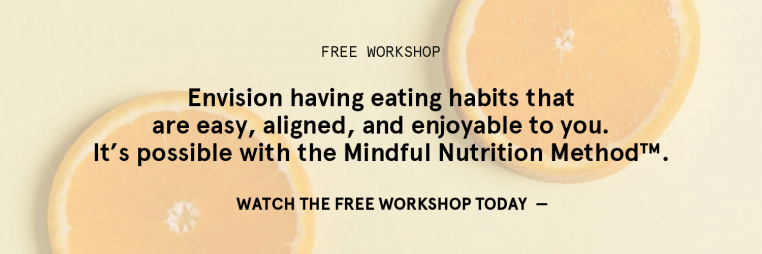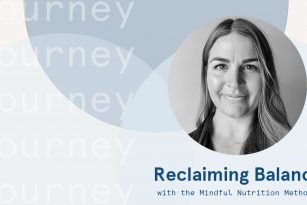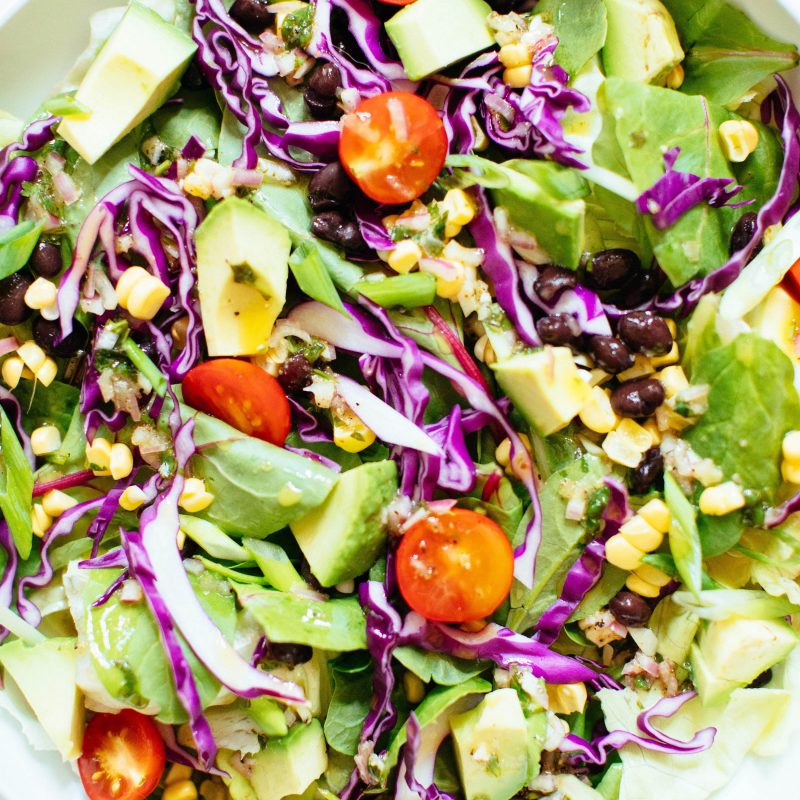Disordered eating habits are often considered socially acceptable or “normal” so you may not realize if your eating habits are rooted in an unhealthy relationship with food or preventing you from nourishing yourself well.
We often find that when members of the community first come to us for support, it’s so clear to us that they have an unhealthy relationship with food, but they don’t even realize that because of how common these behaviors are.
But it’s not possible to create nourishing, supportive, and long-lasting eating habits when you have an unhealthy relationship with food, so we’re sharing the signs your eating habits are unhealthy so you can take action to better support yourself and find a way of nourishing yourself that brings you peace, ease, and balance.
A Friendly Note
Before we dive deep, there are three things I want you to remember as you’re reading this article if you believe you may have disordered eating tendencies. First, you’re not alone. There is a whole community of people out there (myself included!) ready to support you.
Second, it’s never too late, you are always worth it. No matter how difficult or unimaginable recovery may seem at the moment, you are always worth fighting for.
Third, this is always a judgment-free platform. We’re simply here to educate, support and encourage.
Ok, let’s dive in.
Disordered Eating Behaviors Vs. Eating Disorders
Technically, having disordered eating behaviors is a bit different from having an eating disorder. You must meet specific criteria to be diagnosed with an eating disorder. On the other hand, disordered eating habits may be present in the absence of a diagnosis of a specific eating disorder.
I know it sounds a little confusing, but stick with me.
The Academy of Nutrition And Dietetics defines disordered eating as, “a range of irregular eating behaviors that may or may not warrant a diagnosis of a specific eating disorder” (1).
In contrast, each specific eating disorder has it’s own set definition and criteria.
While disordered eating habits may be different from eating disorders, that doesn’t mean they are any less serious. Disordered eating habits can be just as severe and should be treated as such.
8 Signs of Disordered Eating Habits
The following symptoms are specifically associated with disordered eating habits:
- Yo-yo dieting
- Skipping meals to “save calories” or “make up” for foods eaten
- Constant weight fluctuations
- Rigid nutrition or fitness routines and rituals
- Feeling guilt or shame for your food choices
- Obsession with food as it relates to weight and body image that results in a negative impact on daily life
- Feeling out of control around food, compulsive eating habits
- The use of exercise, food restriction, purging or fasting (2)
Unfortunately, in today’s society, many of these signs are considered socially acceptable or “normal”. Because of this, many people are unaware of just how damaging their actions may be to their mental and physical wellbeing.
It can be easy to believe that if you’re experiencing or “needing” to do any of these actions that it’s because you’re doing something wrong or that you don’t have enough willpower or discipline to stick with a certain way of eating.
⠀⠀⠀⠀⠀⠀⠀⠀⠀
But the truth is, if any way of eating — whether it’s following a specific diet, plan, food rule, piece of advice you hear, you name it — is leading you to experience these things around food, that way of eating is not sustainable, supportive, or balanced.
There is no need to experience these things on your journey with nourishing and caring for yourself. Your eating habits should leave you feeling nourished and cared for so you can bring your best self to all that you do.
Not only are these eating behaviors damaging themselves, but they also keep you in the start-and-stop cycle with your eating habits, making it more difficult for you to find a way of eating that’s truly supportive for the long-term.
It’s our mission to support you in cultivating a positive relationship with food and experiencing much more peace and ease with the way you nourish yourself.
Healing Your Relationship With Food and Reclaiming Balance
Kristin, one of our Mindful Nutrition Method™ members, when she had tried so many diets and food rule after food rule, leading to an unhealthy relationship with food and some disordered eating behaviors.
Feeling like she was constantly trying to lose or manage her weight, lead Kristin to find herself in a cycle where she would go all-in and restrict and monitor what she ate to then not being able to maintain that way of eating and feeling off-track.
“I was constantly going back and forth from restricting, to then completely the opposite end of that spectrum, I was binging a lot,” she shared. “I’m really good at losing weight — I know how to lose weight, it’s maintaining it and feeling good in that process because the way that I know how to lose weight is not fun, I don’t think it’s healthy, and honestly, I’m pretty miserable most of the time.”
Kristin shared that she eventually realized that any way of eating that is restrictive or regulated wasn’t going to be sustainable for the long-term.
“It just doesn’t work long-term for me, and I can’t imagine that many people can sustain that for very long. But even if they can, it’s not pleasant, it’s not a fun way to live.”
If the way you’ve been eating brings up negative feelings and emotions, sign up for our free workshop that will guide you on how to let go of these types of behaviors and patterns and embody balance with the way you nourish yourself.










